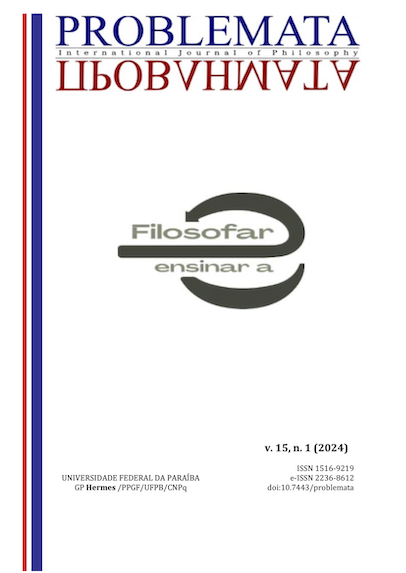A BRIEF HISTORY OF PHILOSOPHY TEACHING IN BRAZIL:
SOME DISCOURSES IN EVIDENCE
DOI:
https://doi.org/10.7443/problemata.v15i1.70227Keywords:
History of Philosophy Teaching, Philosophy Teaching, Teaching to PhilosophizeAbstract
In Brazil, the Philosophy Teaching has become a research topic that, over the past twenty years, has generated a significant bibliographic collection. Currently, the community of researchers in Philosophy Teaching has affirmed the existence of a field of knowledge in its name, from which its institutionalization as a research subarea of Philosophy has been claimed. In this context, this article inquires into the movements and discussions in the name of Philosophy Teaching that historically characterize it. Therefore, it aims to recount the recent history of Philosophy Teaching in Brazil, more precisely at its interface with Basic Education, reporting it from three moments: (1) when Philosophy ceased to be a mandatory discipline in the curriculum of what was then known as secondary education, between the 1960s and 1980s; (2) when the LDBEN/96 recognizes the importance of Philosophy knowledge in school education in the 1990s; (3) when Philosophy returns to the High School curriculum as a mandatory discipline. Along this path, the discussions in each period considered are characterized, and it is concluded that the New High School presents Philosophy Teaching with a new demand: to reflect on the meanings of teaching Philosophy based on the learning and assessment of competencies and skills.
Downloads
References
ARANTES, Paulo; LEOPOLDO E SILVA, Franklin; FAVARETTO, Celso; FABRINI, Ricardo; MUCHAIL, Salma. A filosofia e seu ensino. São Paulo: EDUC, 1993. (Coleção Eventos).
ASPIS, Renata Lima. Problematizações de Alguns Pressupostos do Ensino de Filosofia para Jovens. 2009. In: TOMAZETTI, Elisete Medianeira; GALLINA, Simone Freitas da Silva. Territórios da Prática Filosófica. Santa Maria: Editora da UFSM, 2009.
ASPIS, Renata Lima; GALLO, Sílvio. Ensinar filosofia: um livro para professores. São Paulo: Atta Mídia e Educação, 2009.
BUGS, Jonathan Dalla Vechia. A Base Nacional Comum Curricular do Ensino Médio: implicações para o Ensino da Filosofia. Dissertação (Mestrado em Educação) – Universidade Federal de Santa Maria, Santa Maria, RS, 2021.
BUGS, Jonathan Dalla Vechia. Os desafios para o ensino da filosofia no brasil: um recorte a partir do novo ensino médio. 2023. In: NASCIMENTO, Christian Lindberg Lopes do; VELASCO, Patrícia Del Nero; CARVALHO, Flávio (Org.). V Encontro Nacional Anpof Educação Básica: a filosofia e o seu ensino. Rio de Janeiro: NEFI, 2023.
CERLETTI, Alejandro. O ensino de filosofia como problema filosófico. Belo Horizonte: Autêntica Editora, 2009.
GALLO, Sílvio; KOHAN, Walter Omar. Crítica de alguns lugares-comuns ao se pensar a filosofia no Ensino Médio. 2009. In: GALLO, Sílvio; KOHAN, Walter Omar (Org.). Filosofia no ensino médio. Petrópolis: Editora Vozes, 2000 (Coleção filosofia na escola).
GALLO, Sílvio; CORNELLI, Gabriele; DANELON, Márcio. Filosofia do Ensino de Filosofia. Petrópolis: Editora Vozes, 2003 (Coleção filosofia na escola).
GALLO, Sílvio. Metodologia do ensino de Filosofia: uma didática para o ensino médio. Campinas: Papirus, 2012.
GT FILOSOFAR E ENSINAR A FILOSOFAR – ANPOF. SEM FILOSOFIA NÃO TEM BASE: Carta do GT Filosofar e Ensinar a Filosofar sobre a BNCC. 2021. Disponível em: https://www.anpof.org.br/comunicacoes/notas-e-comunicados/sem-filoso fia-nao-tem-base--carta-do-gt-filosofar-e-ensinar-a-filosofar-sobre-a-bncc. Acesso em: 04 mar. 2024.
HEUSER, Ester Maria; DIAS, Adriana Muniz. Raspas e restos de Filosofia na BNCC-EM: trampolim para uma ética como experimentação. Revista Teias, Rio de Janeiro, v. 21, n. 63, p. 123-134, out./dez., 2020.
HEUSER, Ester Maria; DIAS, Adriana Muniz. Espólios filosóficos na Base Nacional Comum Curricular – Ensino Médio: a dimensão ética. Conjectura: Filosofia e Educação, Caxias do Sul, v. 26, p. 1-29, 2021. Disponível em: http://dx.doi.org/10.18226/21784612.v26.e021033 . Acesso em: 19 jan. 2024.
HORN, Geraldo Balduíno. Ensinar filosofia: pressupostos teóricos e metodológicos. Ijuí: Editora Unijuí, 2009.
NASCIMENTO, Christian Lindberg Lopes do. A presença da Filosofia no Novo Ensino Médio. Maceió: Editora Café com Sociologia, 2023.
OBIOLS, Guilhermo. Uma introdução ao ensino da filosofia. Ijuí: Editora Unijuí, 2002.
RIBAS, Jéssica Erd. A construção do discurso do Ensino de Filosofia no Brasil: uma analítica acerca da constituição epistemológica do campo. 2023. Tese (Doutorado em Educação) – Universidade Federal de Santa Maria, Santa Maria, RS, 2023.
RODRIGO, Lidia Maria. Filosofia em sala de aula: teoria e prática para o ensino médio. Campinas: Autores Associados, 2009.
TOMAZETTI, Elisete Medianeira. Produção discursiva sobre ensino e aprendizagem filosófica. Educar em Revista, Paraná, n. 46, p. 83-98, out./dez. 2012.
TOMAZETTI, Elisete Medianeira; GALLINA, Simone Freitas da Silva. Territórios da Prática Filosófica. Santa Maria: Editora da UFSM, 2009.
VELASCO, Patrícia Del Nero. Ensino de filosofia como campo de conhecimento: brevíssimo estado da arte. Revista Estudos de Filosofia e Ensino, Rio de Janeiro, v. 1, n. 1, 2019.
VELASCO, Patrícia Del Nero. Filosofar e ensinar a filosofar: registros do GT da Anpof 2006-2018. Rio de Janeiro: NEFI, 2020 (Coleções; 4).
VELASCO, Patrícia Del Nero. Objeções e (contra-)argumentos à institucionalização do ensino de filosofia como subárea de pesquisa filosófica. Philósophos, Goiânia, v. 28, n. 2, p. 1-41, jul./dez. 2023.
Downloads
Published
Issue
Section
License
Copyright (c) 2024 Jonathan Dalla Vechia Bugs

This work is licensed under a Creative Commons Attribution 4.0 International License.
Authors who publish with this journal agree to the following terms:
- Authors retain copyright and grant the journal right of first publication with the work simultaneously licensed under a Creative Commons Attribution License that allows others to share the work with an acknowledgement of the work's authorship and initial publication in this journal.
- Authors are able to enter into separate, additional contractual arrangements for the non-exclusive distribution of the journal's published version of the work (e.g., post it to an institutional repository or publish it in a book), with an acknowledgement of its initial publication in this journal.
-
- Authors are permitted and encouraged to post their work online (e.g., in institutional repositories or on their website) prior to and during the submission process, as it can lead to productive exchanges, as well as earlier and greater citation of published work (See The Effect of Open Access).





